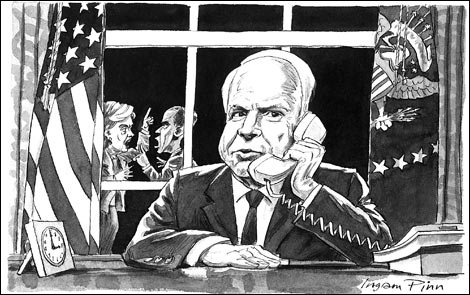| Tweet |

http://news.goo.ne.jp/article/ft/world/ft-20080314-01.html
ホワイトハウス午前3時 電話をとるのは…ジョン・マケインか――フィナンシャル・タイムズ
2008年3月14日(金)16:37
(フィナンシャル・タイムズ 2008年3月6日初出 翻訳gooニュース) フィリップ・スティーブンズ

ジョン・マケインのことを忘れないほうがいい。ひょっとすると11月に勝つかもしれないのだ。ヒラリー・クリントンがわざわざ勝ち方を、このライバルに教えてあげているし。
クリントン上院議員とバラク・オバマ上院議員が、米民主党の大統領候補指名をめぐって展開するし烈な争いに、世界中が夢中になっている。というのもみんな頭の隅で、この民主党の戦いの勝者こそが、ホワイトハウス入りするはずだと思っているから。けれども実際には、ふたを開けてみたら有権者は、違う判断をするかもしれない。それは気に留めておいたほうがいい。
71歳のアリゾナ選出の上院議員は、本当にやってのけるかもしれない。そう真面目に思っている人は、民主党員でも共和党員でも、ワシントンにはたくさんいる。オバマ対クリントンの戦いが長引けば長引くほど、お互いへの攻撃が激しくなればなるほど、「マケインはやるかも」と予想する人数はどんどん増える。今回の米大統領選でいい加減みんな思い知った真実がひとつある。それはつまり、ありえないと思われたものが、確実だと思われたものをまんまと打ち破ってきたというその繰り返しだ。それこそが、今年の大統領選なのだ。
共和党の指名獲得を確実にしたマケイン議員は、ホワイトハウスに赴いた。そこで報道陣の前に立った姿は、目に見えて居心地が悪そうでぎこちなかった。彼のジョージ・W・ブッシュとの対立は、実に根が深いからだ。2000年の大統領選でマケイン氏と共和党候補指名を争ったブッシュ陣営は、「人格暗殺」ともいえるひどい中傷キャンペーンを展開。その被害者となって結局は敗れたマケイン氏は、自分を中傷したブッシュ支持者たちには「地獄の特等席」が用意されているはずだと、そこまで発言しているのだ。
2人はそれ以来、あらゆる局面で対立してきた。イラクにおけるブッシュ政権のひどい無能ぶり、グアンタナモ収容所、捕虜の虐待許可、地球温暖化、そして高額所得者への現在措置など、マケイン議員はブッシュ政権のやりようを次々と批判してきた。
秋の本選に向けて確実なことはひとつある。両党の候補はどちらも、記憶にないほどひどく不人気な大統領の後継者を自認したりは、絶対にしないだろう。マケイン氏が本選で勝つためにはなんとしても、クリントン氏やオバマ氏と同じくらい、ブッシュ時代とは明確に一線を画さなくてはならない。
しかし今週はたまたま、ブッシュ、マケイン両氏の利害が一致していた。保守系ラジオ番組ではクリントン氏なみに毛嫌いされているマケイン氏は、共和党の中心的な支持層と関係を何とかして改善しなくてはならない。それには、ブッシュ氏の力が役に立つ。しかし2人の間に底流として流れる緊張感は、ホワイトハウスでブッシュ氏に並んで立ったマケイン氏の実に慎重すぎる言葉の選び方からも、はっきり見てとれた。これからの選挙戦でもちろん、大統領が遊説を手伝ってくれるならばもちろん歓迎するが、「大統領の忙しいスケジュールで可能な限り」で結構ですと繰り返したのだ。
そしてブッシュ氏にしてみても、「マケイン候補」という展開のパラドックスに気づかないわけがない。共和党の穏健派という立場のマケイン氏を、保守層は毛嫌いしている(そして無党派層は、穏健派マケイン氏が大好きだ)。しかしブッシュ氏にとって最重要な課題について、マケイン氏はとても大事な協力者なのだ。マケイン氏は、ブッシュ政権によるイラク戦争の遂行ぶりを手厳しく酷評してきた。にもかかわらず、ブッシュ政権が残す惨憺たる負の遺産の中からせめて何かはプラスになるものを引き上げようと、誰よりも必死に努力すると約束してくれているのも、マケイン氏なのだ。
米国の外にいると、マケイン陣営から聴こえてくるムード音楽は、これまた違う何かを語っているように思える。というのもマケイン氏は、アメリカ的価値観に対する尊敬の念を立て直し、同盟関係を修復し、友好国の言うことに耳を貸し、数々のジュネーブ条約を再び尊重し、そして気候変動に対する地球規模の戦いに米国として積極的に参加していくと約束した。彼は、世の中のことが分かっている。
マケイン氏は本能的に穏健的でプラグマティックだ。彼の主張がそれを証明している。しかし話はそこで終らない。ベトナム帰還兵でもあるマケイン氏は断固として、イラクで戦い続けると主張しているし、アルカイダに対していっそう激しく戦うと主張する。アメリカの有権者にとっては、マケイン氏の外交政策というとこちらの方がはっきり分かりやすいのだ。
マケイン氏によると、ブッシュ政権による昨年のイラク駐留米軍増派で問題だったのはただひとつ、不十分だったことのみだ。イランが核開発にかける野望についても、マケイン候補の主張はこれ以上ないというくらい明確だ。ただひとつ戦争よりも危険なもの、それは核武装したイラン。これがマケイン氏のスタンスだ。
しかしそこには、目にも明らかな問題がすでにいくつかある。たとえばイラクはいつしかトップニュースでなくなったとはいえ、度重なる世論調査で、イラク戦争は非常に不人気だ。オバマ陣営が繰り返し指摘しているように、昨年の米軍増派の「成功」というのはあくまでも相対的なものだ。確かに2006年に比べれば米軍犠牲者は減った。2005年と比べれば死亡率はほとんど変わっていないのだ。
それにイラクではまだ政治的和解の実現は遠い。米軍は、侵攻直後から3年も戦い続けたスンニ派民兵に武器を与えることで、かろうじて現在の治安状態を確保しただけだ。スンニ派民兵は現時点では確かに、かつて協力関係にあったアルカイダと敵対する道を選んだ。しかしだからといって米国とのこの協力関係は、平和のようなものとはとても呼べず、不穏で不安定な休戦でしかない。ヌーリ・マリキ首相率いるシーア派政府とスンニ派が和解する兆しも、ほとんどと言っていいほどない。
マケイン氏は、必要ならばイラク駐留を100年続けることも辞さないと述べている。しかし米兵が毎日1人死んでいく状況を、米国民がいつまで受け入れるだろうか。世論調査によると、多くの米国民は増派はうまくいったと評価している。しかしほとんどの人は、できるだけ早く兵士たちに帰還してもらいたいと願っているのだ。
米国の安全保障にはどれだけ課題があるかについて、マケイン氏の分析にはいくつか欠点がある。マケイン氏の世界観はブッシュ氏のと同様、善悪二元論的なもので、何もかもがひとつの大きな脅威としていっしょくたにされている。アフガニスタンもアルカイダも、イラン、ハマス、そしてヒズボラも全て、「自由」対「イスラム原理主義」という戦いの敵と味方という区分けの中でいっしょくたにされている。これはブッシュ氏と同じ間違いだ。こうしていっしょくたにすることでかえって、米国を敵視する勢力に、そもそもなかった一体感とまとまりを与えてしまい、そもそもなかった共通の目的を与えてしまうことになる。
とはいえ、いくらこう指摘されたからといって、マケイン氏が選挙戦略を変えるわけはない。安全保障を主要テーマに、本選を戦うつもりなのだ。マケイン氏が勝つには本選の文脈を「危険な状態がいまだ続く国の最高司令官には誰がふさわしいか」という議論にするしかない。ではいったいどうすれば、そこを争点にできるのかというと、問題はない。クリントン議員が親切にも、その前哨戦をすでに開始してくれたからだ。オバマ氏と対抗するためにクリントン陣営が繰り返し放送したテレビCMが、まさにそれだ。
「ホワイトハウス、午前3時」という選挙CMは、国中の子どもたちがぐっすり眠る中、大統領ぽく見えるクリントン氏がしっかり起きていて、何か新しい世界危機を知らせる電話をとる――という内容のもの。逆に言うとつまり、アメリカは、この大事な役目を若くて経験不足なオバマ氏に託していいんですか?というものだ。
これは別に新しい手口でもなんでもない。1984年大統領選では民主党のウォルター・モンデール副大統領(当時)がそっくり同じ映像を使い、やはり民主党のゲリー・ハート候補に対して、大きな効果を挙げた。しかし今回クリントン氏は、この同じ戦術をオバマ氏に対して使うよう、マケイン氏に提案したも同じだ。あるいは、自分がもし民主党候補になったら、どうぞ自分に対してもこの戦術を使って下さいと呼びかけたも同じだ。午前3時の緊急電話をとるのが、戦争捕虜となっても生還した、武勲の誉れも名高い戦争の英雄だった場合と。そして、戦争経験のないクリントン氏が電話をとった場合と。比べて考えてみるといい。
私にしてみると、今回の選挙で目を引くのは唯一、この1点だ。ほかの何よりも増して、民主党にホワイトハウス奪還のチャンスを与えているのは、イラク戦争にほかならないからだ。しかし共和党と同じくらい民主党も、イラク戦争の影におびえて歩いているのも事実だ。
==========================================
英フィナンシャル・タイムズ紙の英文記事はこちら ⇒
http://www.ft.com/cms/s/0/97dbae1e-eba0-11dc-9493-0000779fd2ac.html
3am in the White House: McCain takes the call
By Philip Stephens
Published: March 6 2008 19:14 | Last updated: March 6 2008 19:14
Best not forget John McCain. He might just win in November. Hillary Clinton has been showing him how.
The world is mesmerised by the fight for the Democratic nomination between Mrs Clinton and Barack Obama. The subliminal thought is that whoever emerges victorious from this struggle is assured the key to the White House. It is worth remembering that the voters could decide otherwise.
There are plenty of serious people in Washington, Democrats as well as Republicans, who believe the 71-year- old senator from Arizona could pull it off. The longer and more acrimonious the stand-off between Mr Obama and Mrs Clinton, the more their numbers are likely to swell. Whatever else can be said of this election, we should have learnt by now that it is one in which the improbable likes to trump the inevitable.
There was an obvious awkwardness about Mr McCain’s appearance at the White House this week after he had sealed the Republican nomination. The enmity with George W. Bush has roots. The character assassination that destroyed his bid for the nomination in 2000 prompted Mr McCain to say there would be “a special place in hell” for the Bush supporters who had defamed him.
The two men have since clashed over everything from the administration’s gross incompetence in Iraq, Guantánamo and the sanctioning of torture of detainees to US policy on climate change and tax cuts for the rich.
There is also one thing of which we can be sure: neither of the two main candidates will campaign in the general election as heir to the most unpopular president in living memory. To have any chance of winning, Mr McCain, as much as Mrs Clinton or Mr Obama, needs somehow to promise a break with the Bush years.
This week their interests coincided. Mr McCain, almost as reviled as Mrs Clinton among the conservative talk radio crowd, needs to make peace with his party’s base. Mr Bush can help. The underlying tension, though, showed itself in Mr McCain’s careful choice of words as the two stood side by side at the White House. He would, of course, welcome Mr Bush’s help on the campaign trail, but “in keeping with the president’s heavy schedule”.
For his part, Mr Bush can scarcely have missed the central paradox of Mr McCain’s candidacy. The nominee is scorned by conservatives (and embraced by independents) as a moderate Republican. Yet on the issue that matters most to Mr Bush, he is anything but. Sure, Mr McCain has excoriated the administration’s handling of the war in Iraq, but he promises to fight harder than anyone else to salvage something from the wreckage that is Mr Bush’s legacy.
Outside the US, the mood music of Mr McCain’s campaign has seemed to say something else. After all, he has promised to rebuild respect for America’s values, repair its alliances, listen to its friends, restore Washington’s observance of the Geneva conventions and commit the US to the global fight against climate change. He knows the world.
Yet this apparent testimony to an instinctively moderate pragmatism tells only half the story. It is the resolve of the former Vietnam veteran to keep fighting in Iraq and to wage a still fiercer war against al-Qaeda that better defines Mr McCain’s foreign policy for American voters.
To his mind, the only thing wrong with Mr Bush’s surge in American forces in Iraq last year was that it did not go far enough. As for Iran’s nuclear ambitions, the candidate’s refrain could scarcely be clearer: the one outcome more dangerous than war would be a nuclear-armed Iran.
There are some fairly obvious snags here. Even if Iraq has drifted off the front pages, the polls show that the war remains deeply unpopular. As the Obama campaign never fails to point out, the so-called “success” of the surge is strictly relative. Certainly, fewer Americans are being killed than in 2006, but the casualty rate is little changed relative to 2005.
Nor is Iraq closer to a political settlement. The US has secured the present relative calm by arming the Sunni militias it had spent three years fighting in the aftermath of the invasion. If the Sunnis have now turned against their erstwhile al-Qaeda allies, their accommodation with the Americans represents an uneasy truce rather than anything resembling a peace. There is precious little sign either of a Sunni reconciliation with the Shia-led government of Nouri Maliki.
Mr McCain says he would stay in Iraq for 100 years if that is what it takes. I wonder for how long most Americans are willing to go on losing a US soldier every day. The opinion polls may show that many believe the surge has worked; most, though, still want the troops brought home sooner rather than later.
There are flaws too in Mr McCain’s assessment of the wider challenge to America’s security. His, like that of Mr Bush, is a Manichean view of the world in which everything is swept up into one all-embracing threat. Iraq, Afghanistan, al-Qaeda, Iran, Hamas and Hizbollah are all on the other side of a single struggle between liberty and Islamist extremism. In this, Mr McCain is making the same mistake as Mr Bush by giving a cohesion to America’s enemies that otherwise would not exist and thus inviting them to make common cause.
None of the above will blunt Mr McCain’s determination to fight a national security election. The only way he can win is by casting the election as a choice between commanders-in-chief at a time of continuing peril. And lest anyone wonders how he will do it, Ms Clinton has conveniently provided a preview in the television advertisements she has been running against Mr Obama.
The 3am-in-the-White House advert shows the nation’s children sleeping soundly as a wide awake and presidential-looking Ms Clinton picks up the telephone in the face of some new global crisis. The manifest question: could America really entrust that task to the callow Mr Obama?
There is nothing new in any of this: Walter Mondale used precisely the same imagery, and to powerful effect, against Gary Hart in the 1984 Democratic contest. But now Mrs Clinton has invited Mr McCain to deploy it against Mr Obama – or, with equal effect, against her should she somehow secure the nomination. Picture the telephone in the hand of a decorated war hero and former prisoner of war; and then think about the untested Mrs Clinton.
This to my mind is the really striking thing about this election. Above anything else, the Iraq war has given the Democrats the chance to seize the White House. But they, as much as the Republicans, walk fearfully in its shadow.
|
|
|
|
投稿コメント全ログ コメント即時配信 スレ建て依頼 削除コメント確認方法
|
|
 題名には必ず「阿修羅さんへ」と記述してください。
題名には必ず「阿修羅さんへ」と記述してください。
掲示板,MLを含むこのサイトすべての
一切の引用、転載、リンクを許可いたします。確認メールは不要です。
引用元リンクを表示してください。
|
|
|
|
|
|
|
|